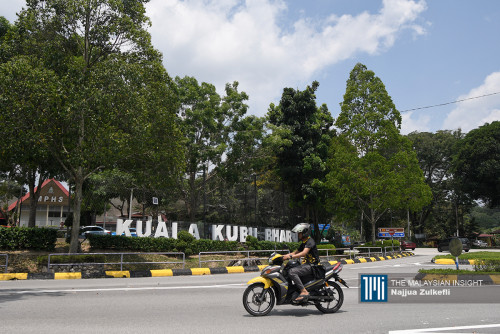SANDAKAN – A wildlife organisation is creating a garden full of wildlife’s favourite food – figs – on used palm oil land in Tawau within the next five to ten years through its reforestation project.
1Stopborneo Wildlife started the project named Plant4Tawau Fig Garden in March 2021, not only to provide food for the wildlife in the area, but with the ultimate goal of creating an animal corridor that would connect Bukit Gemok and the Tawau Hills Park, a protected area under the International Union for Conservation of Nature (National Park category).
1Stopborneo Wildlife founder Shavez Cheema said that Bukit Gemok, which is about 445 hectares, is home to many wild animals including rhinoceros, hornbills, and clouded leopards.
But the animals at Tawau Hills Parkare isolated, as it is not connected to any big forest, and is only surrounded by palm oil estates.
“This is not good. In the long run, local extinction will happen.
“There used to be sightings of helmeted hornbill, binturong and gibbons in Bukit Gemok many years back, but not anymore. We need such corridors for genetic diversity,” he told The Vibes.
Shavez said the Plant4Tawau Fig Garden is a decade-long project.
“We hope that in five to ten years, we will plant enough fig trees that have fruits, sufficient for the survival of endangered wildlife animals in the area, and enough to connect Bukit Gemok to the Tawau Hills Park,” he said.
In order to do this, they would have to plant enough figs to form a six-kilometre-long corridor.
.jpg)
Why figs?
Conservationist Quentin Phillipps in his report, Field Guide to the Mammals of Borneo (2016, p77) characterises the genus Ficus as containing keystone species in the tropical forests of Borneo.
He referred to Ficus' importance as the major food for a range of mammals, including gibbons, fruit bats, and many birds such as the green pigeons, partridges, pheasants and hornbills.
The report explained that fig’s ‘keystone’ role in the forest is further enhanced because they bear fruit asynchronously, providing a ‘continuous background’ of fruit; other fruit-eating (frugivorous) animals, for example, the orangutan and many squirrels, rats and tree shrews rely heavily on fig fruit as a ‘fall back’ food to compensate when other plants, seeds and fruits are not available.
Citing Philipps’ report, Shavez said it has been commonly observed that whenever a fig tree fruits, it creates a ‘wildlife frenzy’: in the canopy, during the day, many birds and mammals can be seen actively feeding.
“At night, too, fruit bats as well as civets, such as the binturong and masked palm civet may be eating the figs, and, below a fig tree, there may be oriental bay owls and other owl species patiently waiting for rats coming to eat the figs.
“This is not all, since we have also recorded Sumatran and Borneo Keeled pit vipers waiting for frugivorous prey, and fallen figs may be eaten by Bulwer’s pheasants, crested firebacks, bearded pigs: and the list goes on. It has even been claimed that some turtle species may supplement their diet with fallen figs,” Shavez said.
Furthermore, the use of the Ficus species for deforestation is ideal; useful on cleared land, especially logged or burned land as it is a pioneer species that would colonise empty and barren land rapidly.
Plant4Tawau fig garden
.jpg)
Now, the Plant4Tawau Fig Garden has about 300 fig trees planted, with another batch of 100 rare fig saplings from the Sabah Ficus Germplasm Centre (SFGC) planted on September 8.
The present fig garden is about two hectares big.
The project has been receiving support and donations from the Sime Darby Plantation (owner of the land), Sabah Wildlife Department and Sabah Parks (tree-planting programmes), SFGC, Sabah Softwood Berhad, Quentin Phillipps and the latest, German Embassy Kuala Lumpur.
Shavez said 1Stopborneo Wildlife is targeting to plant 25 species of rainforest Ficus.
“The intention is that the Tawau Fig Garden will act both as a botanic garden for the conservation of not just rate, but the most popular (among wildlife) species of figs and to attract wildlife to feed on the figs.
“We also hope that it will become an attraction for tourists to view wildlife in the future.
“We might not see the outcome yet for now, but so far, we have spotted a red leaf monkey, two proboscis monkeys came to eat the young figs. Some of the figs are already fruiting. So, hopefully, we will achieve our goal in five to ten years,” he said.
The project will also protect the fig trees and evaluate their effects on biodiversity after they start to grow.
The project’s overarching goals include providing local populations with employment opportunities and promoting tourism through safaris to see hornbills and other species drawn to these forested areas.
From this project, 1Stopborneo Wildlife will be launching another project later this month supported by the German Embassy Kuala Lumpur, named 'Plant4Tawau: hornbill conservation' by the replanting of Ficus in forest tracts of Tawau, South East Sabah.
This project will see the planting of helmeted hornbill (or Rhinoplax vigil)’s favourite fig species – Ficus subcordata.
“Sabah is blessed with eight of the world’s species of hornbill, our Rhinoceros hornbill gains its name because its bill and casque are large and brightly coloured. The biggest of them, the helmeted hornbill, is sadly critically endangered after extensive hunting for its ivory casque.
“Figs that helmeted hornbills feed on is important for their survival. The balance between strangler figs and their seed dispersers such as the helmeted hornbill is delicate: a decline in one population can result in a linked decline in the other.
“This project intends to demonstrate that the opposite can occur: an increase in fig numbers can lead to a resulting increase in seed disperser numbers,” he said.
In other words, their projects are not only protecting endangered animals such as the helmeted hornbill but also protecting their food itself – the figs.
Shavez said the fig-hornbill conservation should contribute to reforestation and wildlife corridor creation but is just one of many actions needed in order to minimise the impact of human activities on rainforest ecosystems. – The Vibes, September 11, 2022



.jpeg)


















